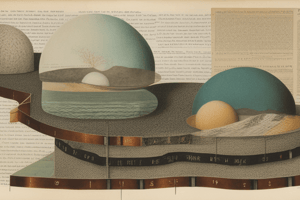Podcast
Questions and Answers
Who conducted the Swan-Neck Flask experiments that provided evidence against spontaneous generation?
Who conducted the Swan-Neck Flask experiments that provided evidence against spontaneous generation?
- Francesco Redi
- Jacob Henle
- Louis Pasteur (correct)
- Robert Koch
Which theory proposed that disease is spread by bad air?
Which theory proposed that disease is spread by bad air?
- Spontaneous Generation
- Miasma Theory (correct)
- Supernatural explanations
- Sinful / moral explanations
What did Robert Koch establish the relationship between, using his postulates?
What did Robert Koch establish the relationship between, using his postulates?
- Microorganisms and wine spoilage
- Bacillus anthracis and anthrax (correct)
- Microorganisms and chickenpox
- Bacillus anthracis and cholera
Which scientist demonstrated the process of pasteurization to avoid wine spoilage by microbes?
Which scientist demonstrated the process of pasteurization to avoid wine spoilage by microbes?
According to Koch's postulates, which of the following must be true?
According to Koch's postulates, which of the following must be true?
What did Koch do to fulfill his second postulate?
What did Koch do to fulfill his second postulate?
What is a limitation of Koch's postulates as mentioned in the text?
What is a limitation of Koch's postulates as mentioned in the text?
What was the impact of Koch's work on the understanding of disease transmission?
What was the impact of Koch's work on the understanding of disease transmission?
What is the main focus of the Germ Theory of Disease?
What is the main focus of the Germ Theory of Disease?
Who made the earliest microscopic observations that eventually led to the development of the Germ Theory of Disease?
Who made the earliest microscopic observations that eventually led to the development of the Germ Theory of Disease?
What was believed to be the cause of disease prior to the acceptance of the Germ Theory of Disease?
What was believed to be the cause of disease prior to the acceptance of the Germ Theory of Disease?
What was the contribution of Antony van Leeuwenhoek to the development of the Germ Theory of Disease?
What was the contribution of Antony van Leeuwenhoek to the development of the Germ Theory of Disease?
Study Notes
Theories of Disease Transmission
- The Swan-Neck Flask experiments provided evidence against spontaneous generation, and were conducted by Louis Pasteur.
- The Miasma Theory proposed that disease is spread by bad air.
Development of the Germ Theory of Disease
- Robert Koch established the relationship between microorganisms and disease using his postulates.
- Koch's postulates require that the microorganism must be found in all organisms suffering from the disease, and that the microorganism must be isolated from the diseased organism and grown in a pure culture.
- To fulfill his second postulate, Koch introduced the microorganism into a healthy organism to prove that it caused the disease.
Limitations of Koch's Postulates
- One limitation of Koch's postulates is that they do not account for diseases caused by viruses, as viruses cannot be grown in a pure culture.
Impact of Koch's Work
- Koch's work had a significant impact on the understanding of disease transmission, as it established the role of microorganisms in causing disease.
Germ Theory of Disease
- The main focus of the Germ Theory of Disease is that microorganisms are the cause of many diseases.
- The earliest microscopic observations that eventually led to the development of the Germ Theory of Disease were made by Antonie van Leeuwenhoek.
- Prior to the acceptance of the Germ Theory of Disease, it was believed that disease was caused by bad air or an imbalance of bodily fluids.
- Antony van Leeuwenhoek's contribution to the development of the Germ Theory of Disease was the discovery of microorganisms, such as bacteria and yeast, using his microscope.
Studying That Suits You
Use AI to generate personalized quizzes and flashcards to suit your learning preferences.
Description
Test your knowledge of Koch’s postulates and their application to the study of tuberculosis. Explore the principles and experimentation behind the identification and isolation of M. tuberculosis.




